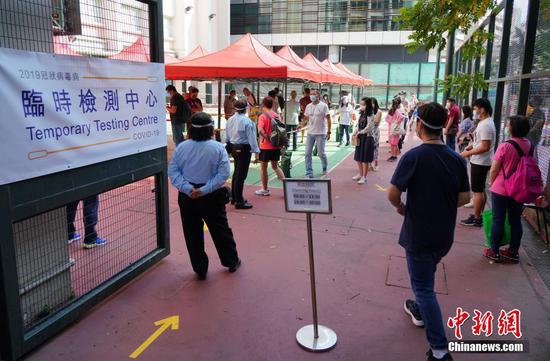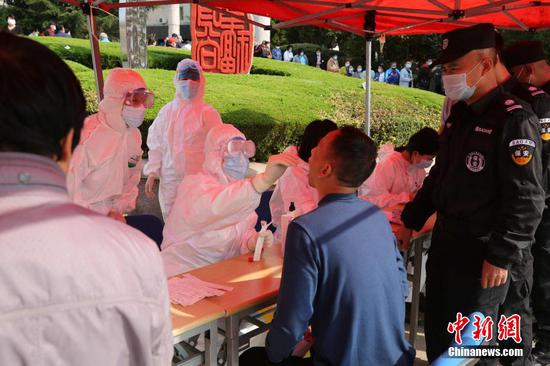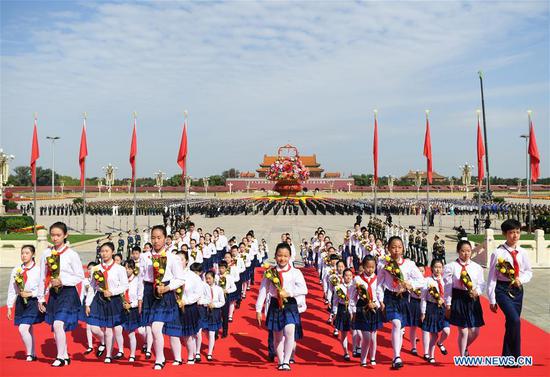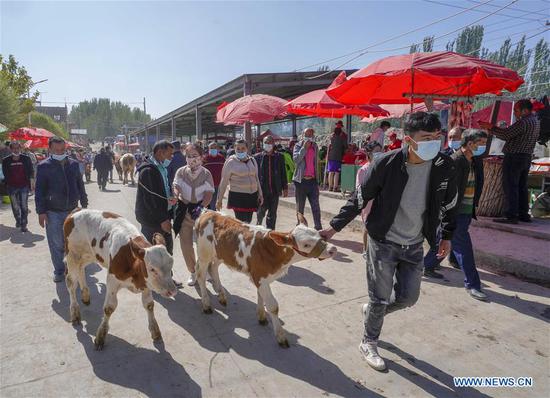2. The Government's Efforts in Promoting the Employment of Ethnic Minorities
In recent years, governments at all levels in Xinjiang have attached great importance to employment, implemented the employment priority policy, and spared no efforts in expanding employment, so as to help the minority people achieve full employment.
1) Attaching Great Importance to the Employment of Ethnic Minorities
The investigation team learned that governments at different levels, ranging from the regional government to town/township-level government, have all established their leading group for employment to coordinate employment-related issues. An analysis on the regional top officials’ speeches, government work reports, work plans and summaries in recent years reveals that "attaching importance to employment", "expanding employment", "stabilizing employment" and "rural surplus labor force going out for employment" are high-frequency expressions. For example, it was put forward at the Ninth Regional Congress of CPC Xinjiang Committee that the employment target in "the 13th Five-Year Plan" was "to create over 2.2 million new urban jobs and over 13 million jobs for rural surplus laborers, and provide dynamic assistance to ensure at least one person in an urban family is employed.” By analyzing the annual work reports of Xinjiang Government in recent years, the team also found paragraphs exclusively dedicated to arrangement on employment. In addition, the regional government has also made a series of special plans on employment. To name just a few, the Autonomous Regional Three-Year Plan on Facilitating Urban and Rural Surplus Laborers in Kashgar and Hotan Prefectures to Go out for Employment (2017-2019), the Three-Year Plan on Poverty Alleviation through Employment for Extremely Poor Areas in the Four Prefectures of Southern Xinjiang (2018-2020), the Plan on Promoting Training for Poverty Alleviation through Employment for Extremely Poor Areas in the Four Prefectures of Southern Xinjiang (2018-2020), and the Autonomous Regional Three-Year Action Plan on Tourism Industry-driven Employment (2018-2020). Since 2018, the Notice on Poverty Alleviation through Employment in Extremely Poor Areas in the Four Prefectures of Southern Xinjiang has been issued for three years in succession. Following the autonomous regional CPC Committee and government’plans on employment, the Party committees and governments at prefectural, city and county-level have also formulated and issued their own special work plans on employment based on local realities. Since 2018, Xinjiang has held a number of conferences on employment of its southern four prefectures. In 2018 alone, Xinjiang has successively held the "teleconference on transferred employment and poverty alleviation through employment of rural surplus labor force", the "teleconference on poverty alleviation through employment in extremely poor areas" and the " teleconference on rural surplus laborers’ transferred employment and tourism industry-driven employment" in the four prefectures of Southern Xinjiang, which made special arrangment on the employment in the four prefectures. All these have provided strong policy support and institutional guarantee for promoting the employment of the local ethnic minorities.
2) Establishment and Strict Implementation of the Laws and Regulations for Employment and Labor Rights Protection
According to the Chinese Constitution, the Labor Law, the Employment Promotion Law, and the Labor Contract Law, Xinjiang has formulated and promulgated a series of autonomous regional laws, regulations and normative opinions, such as the Measures for Implementing the National Employment Promotion Law, the Measures for Labor and Social Security Supervision Regulations, the Regulations on Protection of Employees’Rights and Interests, Regulations on Labor Dispatch, the Regulations on Collective Wage Consultation of Enterprises, the Trial Management Measures for Economic Layoffs in Enterprises, the Guiding Opinions on Standardizing Management of Labor Contracts, the Implementation Opinions on Building Harmonious Labor Relations, and the Guiding Opinions on Further Strengthening and Standardizing Management of Dispatched Laborers. These laws and regulations have clarified the essential labor rights and protection measures for workers of all ethnic groups, thus ensuring a legal basis for employment and labor rights protection in Xinjiang.
3) Respect for the Ethnic Minorities’ Employment Intentions
The investigation team learned that ethnic minority people’s voluntariness has always been the premise for the local government to organize them to go out to work. The government solicits in advance their employment preferences concerning their desired region, industry, type of work and post, and training needs. Pre-job training on the required occupational skills for specific posts are provided after the people voluntarily sign up for seeking outside employment. This process is clearly stated and emphasized in government documents. For example, the Autonomous Regional Three-Year Plan on Facilitating Urban and Rural Surplus Laborers in Kashgar and Hotan Prefectures to Go out for Employment (2017-2019) points out that "urban and rural surplus labor force aged 18 to 45, who have the intention to go out to work, can be recruited with agreement of human resource and social secuty department...” The Three-Year Plan on Poverty Alleviation through Employment for Extremely Poor Areas in the Four Prefectures of Southern Xinjiang (2018-2020) defines the objects of poverty alleviation as "the labor force with labor ability and desire for employment or entrepreneurship among the registered poor population in the 22 extremely poor counties in the four prefectures of Southern Xinjiang." The Plan on Promoting Training for Poverty Alleviation through Employment for Extremely Poor Areas in the Four Prefectures of Southern Xinjiang (2018-2020), requires “to take every administrative village as a unit to find out the intentions of laborers from poor families on going out for employment" and "to provide entrepreneurship training for those with desire and conditions to start their own business". These statements reflect the government’s respect for the employment intentions of ethnic minorities. For those who are unwilling to be employed due to their health or other reasons, their will is fully respected, and they are never forced to sign up for training.
4) Service-oriented Organization of Employment
Xinjiang has established an organizational mechanism for employment and job security. Through the practice and exploration in recent years, Xinjiang has built a complete, scientific, standardized and efficient employment system and mechanism, and formed a closely linked one-stop service system from post information collection to training and taking up a job.
The procedures for organizing employment have been standardized. The procedures of government organized employment for people of all ethnic groups include: first, the recruiting enterprises provide information on the vacant posts and the number of employees they need; second, the human resources and social security departments publish the recruitment information through the Internet and human resource market after summarizing all the job information; third, the village/community Party committee publishes the recruitment information on the village/community bulletin board; fourth, the village/community Party committee officials go to the families of the unemployed to learn about their employment intentions and inform them of the job information; and fifth, the people voluntarily sign up for vocational training and took up their posts after passing the training examination. The one-stop service has provided organizational guarantee for the employment of ethnic minorities.
Vocational training has been strengthened. Every year, the government invests a lot of money in this area. Aksu Prefecture determines the occupation (job type) of training and number of people according to individual willingness and market demand, and focuses on skill training for rural surplus labor force going out for employment and pre-job training for new staff recruited by textile and garment enterprises, which effectively improve the employability of the local labor force. According to statistics, from 2014 to 2019, Xinjiang arranged various skill trainings for 6.957 million people, among whom 2.325 million were from the four prefectures of southern Xinjiang (as shown in Figure 1). The region has also helped foster 379,400 new entrepreneurs, who have offered jobs to 827,400 people, that is, an average of 75,900 people started their businesses every year (as shown in Figure 2).
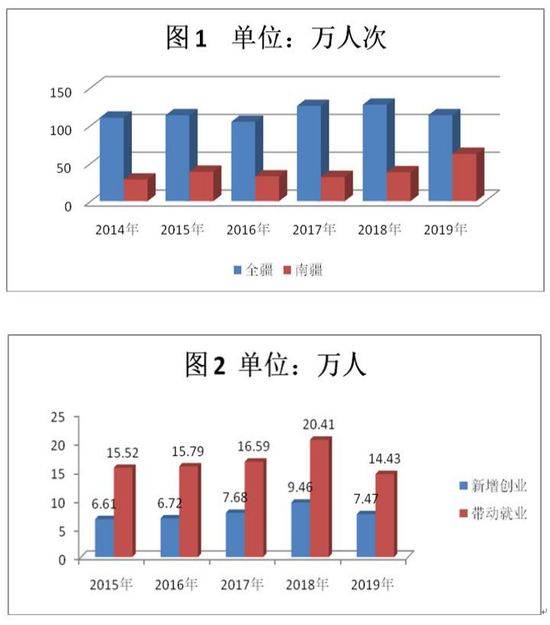
Figure 1:
Unit: 10,000 person-times; blue bar for “whole Xinjiang”; red bar for “southern Xinjiang”;
Figure 2:
Unit: 10,000 people; blue bar for “new entrepreneurs”; red bar for “jobs offered by new entrepreneurs”)
With the help of the government, many ethnic minorities have found satisfactory jobs. According to statistics, from 2014 to 2019, 16.57 million rural surplus laborers went out for employment in Xinjiang, with an annual average of 2.762 million, including 10.07 million from southern Xinjiang, an annual average of 1.678 million (as shown in Figure 3).
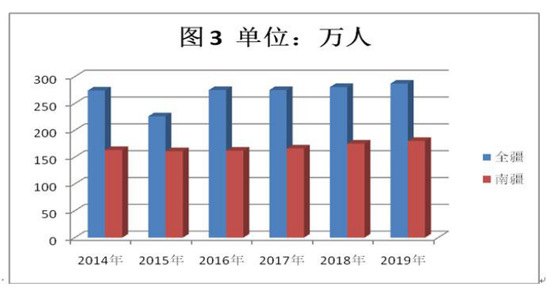
Figure 3:
Unit: 10,000 people; blue bar for “whole Xinjiang”; red bar for “southern Xinjiang”)











